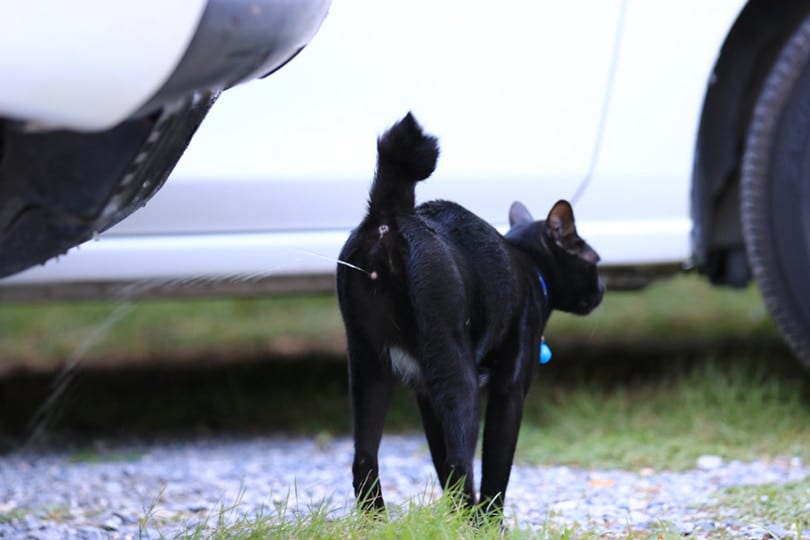Having a pet brings extra love and laughter into a household. Cats make excellent additions to almost any home, but sometimes, there are behavioral problems that owners can struggle with, like cat spraying.
Cats are territorial creatures by nature, and they require their home to feel secure. They work to ensure this security by leaving their mark on any place that they want to claim as their own.
Most of the time, cats establish their mark on their territory by rubbing their bodies against something, like a piece of furniture. They might even do this on you.
We can barely smell this form of marking, and instead of being unhealthy, it usually means that your cat is happy and safe at home with you. You can take it as a positive sign.
However, what does it mean when your cats begin to spray to mark their territory? Why are they making such a mess? Is there any way to stop this behavior? We discuss the answers to these questions.
Click to skip ahead:

What It Means When Your Cats Spray
Although you might not have ever noticed your cat doing so, spraying is a different type of marking that typically happens outdoors. In the outside world, cats have more competition with other animals to establish their territory and keep it safe. Spraying is a way of communication with other cats about socially stressful situations, such as when there is an increase in the cat population density.
When your cats spray outdoors, it is akin to what a dog might do out on a walk, sniffing and then peeing over the area that they just sniffed. It doesn’t inconvenience you and is a perfectly natural behavior.
However, when cats begin to spray indoors, it means that something in their world has gone wrong. They do not like to create messes, and it is not in their nature to spray where they feel comfortable.
Predominantly, cats will begin to spray inside when they feel the need to make their claim on their territory even more apparent. Until your cat believes the problem is gone, their anxiety in the home will not decrease.
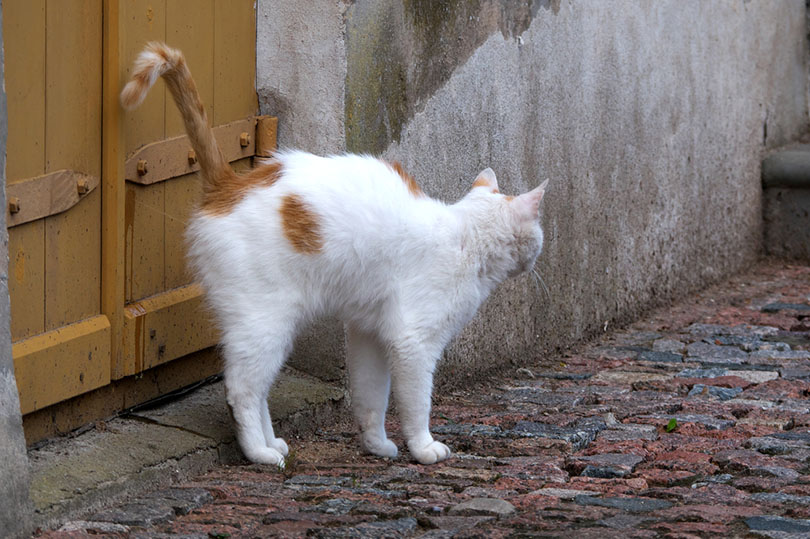
Signs That Your Cat Is Spraying Indoors
If you suspect that your cat might be guilty of spraying indoors but need confirmation, there are signs that you can look for around your home.
The first is the most obvious: catching your cat in the act. If cats are still housetraining or very old, they might not be spraying, but instead choosing inappropriate places for elimination. This accidental behavior will generally occur on horizontal surfaces.
Cats that purposefully spray will often lift their back and arch with their tail high in the air, aiming for a vertical surface.

The 4 Reasons That Your Cat Sprays
There are quite a few reasons that your cat might begin spraying inside, typically boiling down to increased vulnerability.
1. Anxiety or Discomfort
The first possibility is that they are not feeling well. Cats spraying indoors is not a natural behavior. They are clean animals that appreciate having a tidy home.
There are certain stressors that might change their typical behavioral patterns. Much like with humans, environmental changes can alter a cat’s ordinary state of relaxation or security.
Spraying might be their way of increasing their self-assurance or coping with a stressful situation.
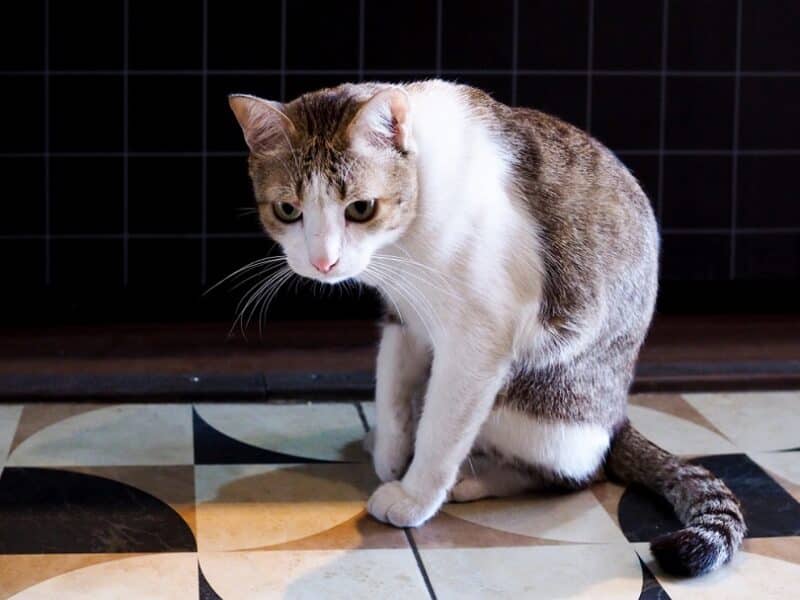
As soon as you confirm that your cat is spraying, take them to a vet for a check-up. Their stress might be behind pain or discomfort that might not be as evident to you, but spraying could be a call for help.
2. Changes to Their Home Life
The larger issue with spraying inside the house is almost always the level of security that your cat feels in their home. When significant changes happen, it might seem like a cat rebels by spraying.
However, it typically isn’t a form of rebellion. Instead, cats are looking for reassurance over their own territory. It could be because you moved things around and they don’t understand why.
3. A Stranger in Their Home
Strange people or animals in the home is another factor that can make a cat feel vulnerable and afraid. This could occur if you frequently have strangers visiting or go on vacation, leaving them in the care of someone they don’t know. Maybe you adopted another animal, so your cat needs to make it clear to them whose house this is.
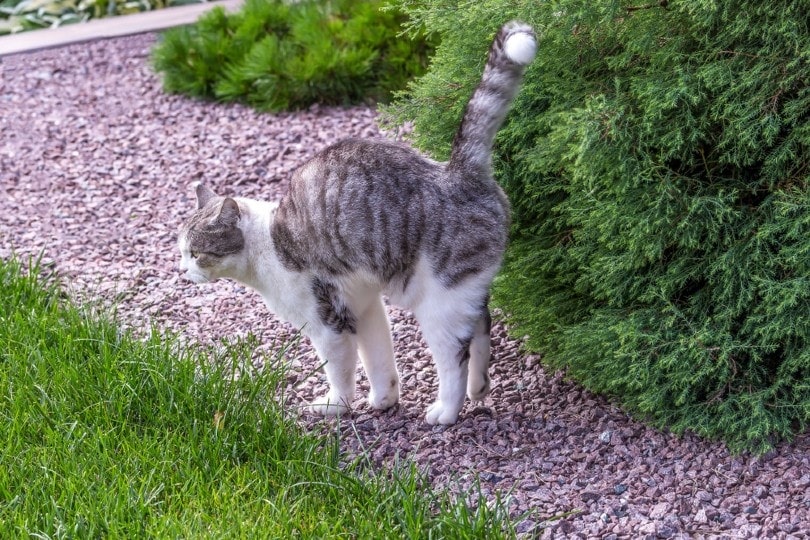
4. Mating Rituals
One of the primary reasons for cats spraying is flirting. When an unneutered male sprays, it lets females know that they are available and the amount of territory that they are “in charge of” within the home or outside.
If your cat was neutered later in their life, spraying could be a holdover from their days of being on the prowl, so to speak. They will typically do this if they sense a new female around or can tell that a female is in heat.

The 4 Ways That You Can Stop Your Cat Spraying Indoors
Visiting the vet is always the first thing that you should do if you notice a significant change in your cat’s behavioral patterns. Beyond that, you might need to take personal action to solve the problem.
1. Make Them Feel Safe
One cause for this behavior is an underlying feeling of vulnerability. Figure out what could cause this feeling by taking note of where your cat typically sprays.
Let’s say that they spray within a hallway or a seemingly innocuous space in the home. In that case, it might be because that is where they typically come across another animal that they haven’t yet grown to feel comfortable around. You might need to separate their litter trays, food bowls, and toys until they grow accustomed to each other.
If you notice that your cat is spraying on a window or doorway, it could be because they perceive a threat outdoors, usually another cat. Try to see if there are possible ways to keep those cats out of your yard or property. Ensure that you are closing the cat flap, or get a microchip-reading flap to make sure no other cat can get inside.
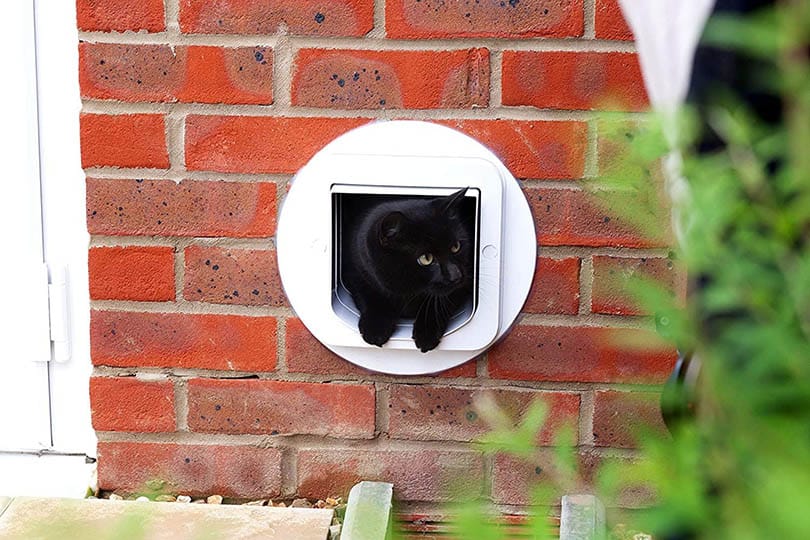
2. Clean the Area and Keep Them Away
If your cat is spraying in a specific place, even passing by can trigger a similar behavioral response. Clean the area with an enzymatic spray; this product is made specifically to destroy the scent of cats.
The next step is to keep them away from the area until you can fix whatever the perceived issue is. For example, if they are afraid of strangers and tend to spray somewhere in your room to establish their territory, close the bedroom door when you have visitors.
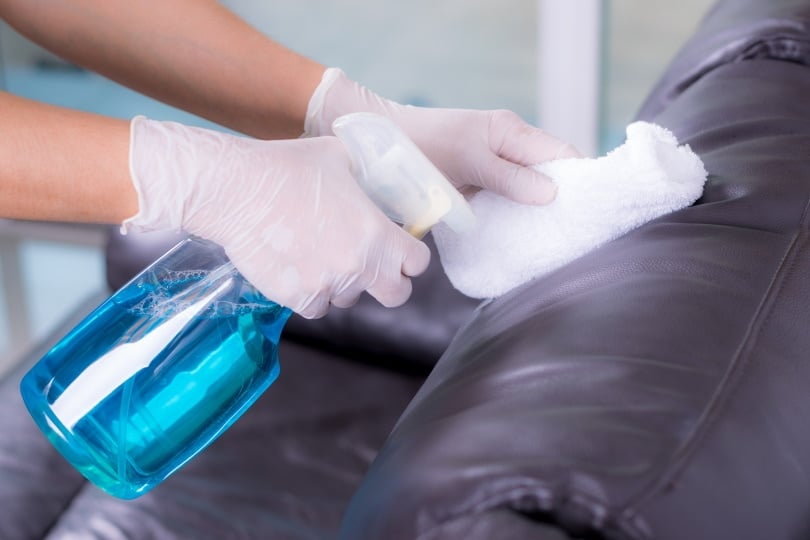
3. Introduce Strangers Slowly
If you are going on vacation, introduce your cat’s caretaker to them before leaving. Let them spend time together before you leave. Ensure that the cat receives reinforcements in the way of their favorite treats, toys, and cuddles for positive interactions with the caretaker. Doing this will help make your cat more comfortable around the person instead of being scared when you are gone.
4. Desex Your Cat
Reproductive instinct is one of the strongest, and if your cat is spraying in hopes of finding a mate, you will never win that battle. Moreover, you might end up with an unplanned kitten litter, or your cat might disappear for days at a time. With modern veterinary medicine procedures, neuter/spay surgeries are safe and accessible. The sooner that you get your cat fixed, the less likely they will continue to spray after the procedure due to habitual behavior development.
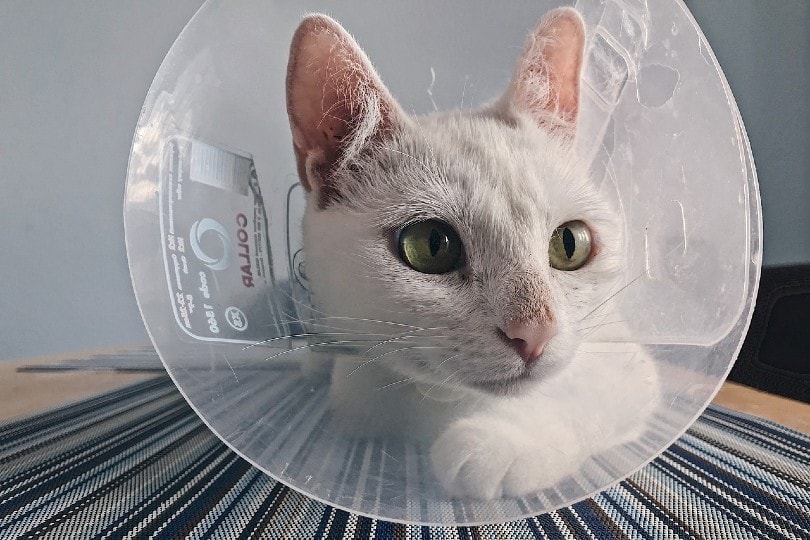
Featured Image: Nadezhda Zaitceva, Shutterstock

